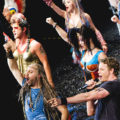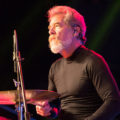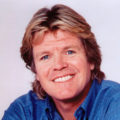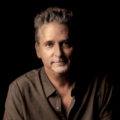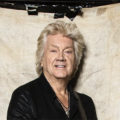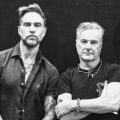Artist/actor Michael Des Barres examines “Live!” EP, “Obsession,” Power Station, “MacGyver”
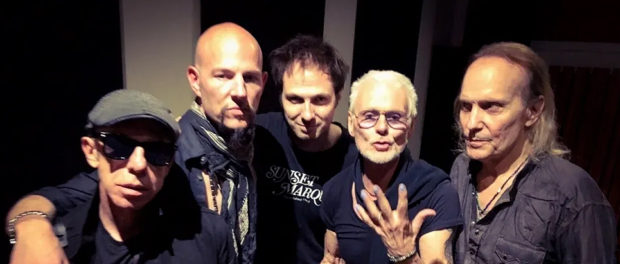 Photo provided by Golden Robot/Die Laughing Records
Photo provided by Golden Robot/Die Laughing Records
Amazon Prime’s most streamed rock and roll movie of the season asks the ultimate question when it comes to Michael Des Barres: “Who Do You Want Me To Be?” For some, he stands out as the totally over the top leader of Silverhead, the British glam band that dropped a boisterous glitter bomb with “16 And Savaged.”
To others, perhaps its leading the harder-edged Detective, which also featured former members of Steppenwolf and Yes, for a pair of projects on Led Zeppelin’s Swan Song label. Then there’s writing and originating the synth-pop staple “Obsession” with duet partner Holly Knight, or starting Chequered Past with his buddies from Sex Pistols and Blondie just in time to tour with Duran Duran.
That of course put him right in front of “Hungry Like The Wolf” heartthrobs John Taylor and Andy Taylor, who were finding rivaled fame in The Power Station and just so happened to be seeking a singer to tour the entire “Some Like It Hot” season. Not only did Des Barres ace every opportunity that came his way with the group (Live Aid, “Miami Vice,” Arnold Schwarzenegger’s “Commando”), but it opened the door to a mammoth TV breakthrough of playing the assassin Murdoc on “MacGyver.”
He’s stayed on screens of varying sizes ever since, including the reboot of that enduring series, all while maintaining a musical career that’s currently backed by The Mistakes, plus a daily SiriusXM Satellite Radio slot on Little Steven’s Underground Garage. With the digital drop of a “Live!” EP and the promise of a vinyl pressing on the horizon, Chicago Concert Reviews secured a no-holds barred hour with the artist/actor, who broke down the raucous collection of covers and dished on five decades in the wild world of showbiz.
 How did you choose the selections that wound up being on the live collection?
How did you choose the selections that wound up being on the live collection?
Michael Des Barres: We were just jamming in rehearsal and playing different songs. [We picked] the ones that sounded fun, that we embraced and played pretty good. I always knew that “16 And Savage” from Silverhead was an anthemic song from a lot of people. I thought [Marvin Gaye’s] “What’s Going On” was appropriate given the circumstances we were under. Obviously, you can’t do a rock and roll show without Little Richard [included in the closing medley]. I loved T. Rex and The Power Station did “Get It On.” The song choices were really random. We just did a video for “Detective Man” from Detective. It’s a great song, hence it’s on that EP, but there are so many more songs that we did that night.
Bring us back to the day it was recorded at The Hi Hat.
Des Barres: Like any other. I’m ready. I’ve got my leather trousers. I mean, I’m 72-years-old. I started in 1970, so it wasn’t like “I was thrilled and I couldn’t wait.” It’s just a gig. I love to play live. It’s my favorite thing to do anything live in the moment where anything can happen, hence the name of the band. The greatest things that have ever been done have been a f***ing mistake [laughs], including a couple of marriages. To me, I’ve lived and breathed this for decades, so it was just a wonderful evening. The band is amazing with incredible musicians I’ve known over the years. When we rehearsed, I walked in and said “you’re all 17 and you’re in your bedrooms. Go!” [laughs] It was just so real, and so fun, and so innocent, and so sexy, and fresh. It felt great. It felt beautiful. I loved it…I want you to know there were no overdubs. Nobody went in, put the cans on and played their solos. It’s absolutely “what you hear is what we did.” That’s important to me, otherwise it’s fake. Live music is not somebody going in and doing post-work. It was our second gig.
It sounds like you were just getting started, so this is going to have to tide everyone over until shows start up again.
Des Barres: For me, I’ve had to work through [the pandemic]. I have a radio program every day and I do this video game for Warner Brothers, which is an extraordinary experience, so I’m working my a** off. But in terms of live music, we’ll see. I don’t miss it. I don’t miss anything particularly. I’ve had a long and beautiful life [filled with] ups and downs, ins and outs, miracles and nightmares. That’s a great album title, but that would sum me up. I don’t regret anything or long to play live.
Do you have any memorable touring trips through Chicago?
Des Barres: Yeah, we played countless times in Chicago with all of my different bands. I remember the first time Silverhead came to Chicago. I was 20 maybe and I just wanted to hunt down the corner where Little Walter played harmonica on or wherever Muddy Waters played. Chicago and all that that mythological blues stuff is incredibly important to me…When I was a kid in boarding school, this friend of mine played me Robert Johnson and John Lee Hooker, and I went “yup, thank you. Yes, please!” Chicago is a holy city. Chicago is Jerusalem.
 Let’s go back to the very beginning and have you share a snapshot of Silverhead.
Let’s go back to the very beginning and have you share a snapshot of Silverhead.
Des Barres: It would be an extremely pornographic snapshot [laughs]. A Polaroid you could never show anybody. I was doing a West End musical in London in 1970 about an androgynous rock star. Andrew Lloyd Webber came to see it, liked my voice, had me sing some demos for “Jesus Christ Superstar” and he got me a record deal. I was 17 and that brought me a lot of attention. I did a lot of acting gigs and I really wanted to just play music. Then Andrew, God bless him, put Silverhead together, which was un-f***ing believable. We literally lived and breathed it for a couple of years and played so many shows.
It was an amazing time because it was very Machiavellian, bizarre, perverse, controversial [world with] cocaine, girls, velvet, androgyny, make-up, a white Rolls-Royce, [groupie, musician, actress and author] Miss Pamela, Los Angeles and Whisky A Go Go. It was every dream that you’ve had that has never been captured in an f***ing movie of what it really meant to do that. In those two years, I think I had a nap in August of ‘71. Other than that, it was just an incredible experience. Great guys, great music, but it could not sustain because of the naughty behavior.
Then of course there was Detective and getting signed by Jimmy Page to Swan Song Records. What did that bring to the band?
Des Barres: It brought us public attention. From the outside, to be on Swan Song Records is probably very glamorous. From the inside, not so much because they are Led Zeppelin. They are not executives and you need business people. No matter how good your band is, you need to be promoted, encouraged and confided in. You need somebody with all ears and we were so naïve. I knew Jimmy because he liked Silverhead, and he was with Miss Pamela, my ex-wife, [though] he’s also very family-oriented. We stuck around in L.A. after signing with Swan Song for a year [waiting for him] to get it together, to come over and produce, and that never happened. That took a big wind out of the sails to a degree…It was an incredible experience, fraught with rock and roll issues.
Your song, “Obsession,” was a not only a huge hit for you and Holly Knight, but also Animotion. What does that song mean to you?
Des Barres: Three houses. And three chords I think. No, it’s meant a lot. I wrote it when I got sober after heroin. I wrote it about narcotics, but then I played it for Holly. She suggested it should be about romance, so I sort of turned it into a lover and it was huge. It was a great experience and it still is. Karen O from the Yeah Yeah Yeahs cut it recently. It’s had a life, you know? I’m very proud of that song.

The Power Station
Des Barres: Exactly right. I love that you know that…Some nights we were the best band in the world, but it was a narcotic band. It was very difficult, and again, [there were] stumbling blocks…When Robert [Palmer] split [from touring with The Power Station], Andy said “get him.” I was in Texas with Don Johnson, who was making a movie, just having fun. I got a call from Wayne Forte in New York, a promoter. “There’s a band that has a six-month tour booked and need a singer.” I said “what’s the band?” He said “I can’t tell you.” “Well, give me a limo and a first class ticket. I’ll come to new York and find out. Sound good?”
I go to New York, get in the elevator literally from the airport, go up to the office and there’s John and [Chic’s] Tony Thompson nervous and sweating. The [self-titled debut] album was number one. They go “oh yes, what do you think?” I go “yeah!” “Well, you gotta fly to London tonight, so let’s go the Record Plant, get the record, take Robert’s voice off, get on the plane, learn the songs and go see Andy in London.” So I do all that, I get on the plane, I learn the songs, I go to the studio and I wait 8 hours for Andy to show up. He shows up with two bodyguards and a billowing cloud of marijuana smoke. I sing a verse and chorus of “Get It On.” He hits the control button and goes “cool.” I go back to New York [laughs] in my white limo and go to the Carlyle hotel. I get up and rehearse, and a week later, I was at Live Aid.
How did it feel standing on stage at Live Aid, not only looking out at the masses, but knowing it was the largest televised concert at the time?
Des Barres: Well, my hair looked really good that day, so I was really happy about that. Another gig baby, just another gig.
Did you feel any pressure, either about the significance of the event or stepping into this supergroup in general?
Des Barres: I’m not interested in pressure. I’m not interested in events. I’m interested in rock and roll. See, the thing is man, people were saying “oh, he’s got such big shoes to fill.” I said, “I’ve got my own f***ing shoes.” There’s no pressure. There’s only pressure if you feel it. Remember, at 16 I’m on the West End stage of London and with Sidney Poitier in a f***ing movie [“To Sir, With Love”]. You can’t lose your sense of self. I never feel pressure. I just want to have fun, be good and learn the songs. I have great discipline. I go out there and I do it. The thing is, you can’t win with that s*** because when you’re replacing a beloved character like Robert Palmer, of course you’re gonna get critics. It’s just human nature to critique and pick bones about something they don’t like rather than something they do like. I don’t think about that s***. I go out there to have fun and get paid an awful lot of money to do so.

Photo provided by Ross Halfin
Robert [was like] Marvin Gaye and I am [like] Steve Marriott, [the front man for Small Faces and Humble Pie], so there’s a different feel that I gave it live. It was a rockin’ show. The reason Robert didn’t do it is because he didn’t feel he could do it in front of 60,000 young people, 20,000 topless, and I could [laughs] because you’ve gotta entertain that crowd. Robert was a very restrained performer, God rest his soul, and he didn’t run from left to right and say “let me see your hands!” He wasn’t that kind of guy and I could do that. They’d seen me do it when I played with Duran, and make an audience enjoy themselves, and that’s their motive.
Immediately thereafter, being Murdoc on “MacGyver” was a pivotal role for you and very significant for the series. Any recollections that jump out?
Des Barres: It was so interesting because right after the tour, I got a call from my agent saying “there was this episode of ‘MacGyver’ with an assassin, and somebody saw you in L.A. at the Greek Theatre, a producer, and said you looked pretty menacing up there.” So I went, did the episode and people went crazy. The fans loved the character. It’s just a fantastic character with all the different identities and accents. He was determined to kill MacGyver, and [lead actor] Richard Dean [Anderson] is such a sweetie that they hated me so much, and they had me do a bunch of them. It was an amazing experience and remains so because I did the reboot.
What brought you back to the reboot?
Des Barres: Money [laughs]. No, no, no, I was on it to continue the vibe of that character 35 years later [as Murdoc’s mentor Nicholas Helman]. Nobody’s ever done that, so I thought this is a fantastic opportunity to do something like this and I really liked the producer very much who asked me do it…I think an interesting story perhaps is when the first episode was shown with the new Murdoc, social media went insane and hated it because they loved my character. I thought he was fantastic and I [said so] on social media. “Don’t f*** around. This is a great actor.” CBS went “wait a minute, he’s now just boosted the ratings by liking the character that he played,” cause Richard refused to do it. And I genuinely thought “this guy’s great. What’s the problem?” They said “would you like to come on?” [laughs]. Good deeds darling. That’s how that happened and then the audience liked what I did. There was one episode with a really long fight sequence. I’m 72-years-old, but I’m in pretty good shape that it was charming I think. The people that liked the original series were proud of the fact that could be done. It’s all very psychological, but I love the attention and I’m very happy they were entertained.
 You’ve also guest starred on practically every major show imaginable. Which ones are your favorites for any reason?
You’ve also guest starred on practically every major show imaginable. Which ones are your favorites for any reason?
Des Barres: I really enjoyed “Just Shoot Me!” because the writing was so exquisite. They let me improvise and that was fun. The “Seinfeld” episode was classic because they were like The Beatles of television, those four brilliant [comedians]. But the one that really stood out for the majority of my fans was “WKRP In Cincinnati” because there was a depiction of a rock band, Scum Of The Earth, but in a different way in suites and ties. Not a day goes by when I don’t get a Scum Of The Earth vibe on social media.
I like “Melrose Place” too cause I’m very close with Heather [Locklear] and that was really fun. Also, when I played the gay dude on “Roseanne,” Martin Mull’s lover. I was told by my managers not to do it, because of AIDS…I think doing that was a ballsy thing to do, pardon the pun. I really wanted to play that character because Murdoc is one thing, but to be able to sustain that particular vibe, I thought was terribly important for AIDS, and the acceptance of equality, and sexuality, and so on.
What do you hope viewers will take away from “Who Do You Want Me To Be?”
Des Barres: To find out [laughs]. The title is a journey, it’s not the destination. It’s not how I feel today. It’s the chorus of “Obsession.” It sums up what I’ve had to do to survive and I’ve done that. No parents, boarding school stuff, this marquee business and all of these things that have happened to me over the years with all these different people. It’s been quite a journey, and the movie addresses all of those things, so I would highly recommend you see it just from the pure notion of staying in the game, and the courage that takes to be knocked down, get up again and win on a “Rocky” level…I think it hits a nerve. Somebody who stuck to it and didn’t die at 27. I’m the opposite, I’m 72. I’m club 72. F*** that!
For additional information on Michael Des Barres, visit MichaelDesBarres.com.

